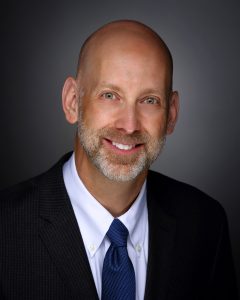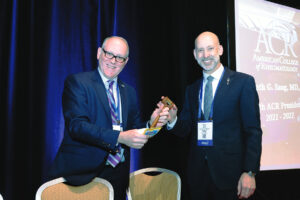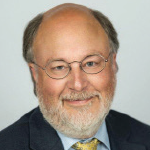In his new role as the 86th president of the ACR, Douglas White, MD, PhD, is excited about the opportunities to serve and energize the organization and its members in the coming year.
About Dr. White

Dr. White
Dr. White received his MD and PhD degrees from the University of Iowa, Iowa City, followed by a residency in internal medicine at Parkland Hospital, UT Southwestern Medical School, Dallas, and a fellowship in rheumatology at Barnes-Jewish Hospital, Washington University in St. Louis. His career led him to Gundersen Health System, La Crosse, Wis., where he is now chair of rheumatology and head of the Rheumatology Research Lab.
He has spent more than a decade as an ACR volunteer, serving as a member of the ACR Board of Directors, chair of the Committee on Rheumatologic Care (CORC) and chair of the Finance Committee. He has participated in several additional committees and work groups, tackling ethics and workforce issues, health information technology, strategic planning efforts and more. He also serves on the Board of Directors of the Local Lupus Alliance, La Crosse, Wis.
As Dr. White prepared to begin his term as ACR president, he took a few moments to think about the year ahead and his hopes to help build a stronger organization by bringing members an especially dynamic and revitalized annual meeting, making ACR’s wide-ranging resources even more accessible to today’s tap-and-find users and staying true to the College’s vision of being there for members “so you can be there for your patients.”
The President Speaks
The Rheumatologist (TR): You began as an ACR volunteer in 2011 and have continued to serve since. How did you come to volunteer for the College, and why do you remain involved?
Dr. White: I got started at the invitation of a trusted friend and colleague who was serving on one of the committees at the ACR. She called me one day and said, “I’m going to nominate you for CORC. I think you would like it.”
And I did.
Once I became a volunteer, I learned quickly that the ACR does far more than I was aware of. I also found that volunteering provided an opportunity to work with extraordinary people on worthy goals. That’s what has kept my interest.
TR: From your many years volunteering with the ACR, what are some personal highlights?
Dr. White: One was while volunteering on the Alternative Payment Model work group (2016–18). We were basically tasked with thinking deeply about value-based reimbursement. The lessons learned from that continue to inform everything the ACR does on the advocacy front, so it was a valuable exercise.
I was also treasurer when the ACR decided to write a reserve policy. For that, the College and the Board of Directors had to carefully consider how much money we should save and when it is OK to dip into the reserve. Being part of that policy discussion was quite fulfilling. (Note: TR interviewed Dr. White about his role as treasurer in 2019; https://tinyurl.com/4v2f825p.)
A third highlight was being part of the COVID-19 Practice and Advocacy Task Force, which was one of the three main prongs of the ACR’s response to the pandemic (2020–present). During a time of uncertainty, we were able to share a lot of information with members in a timely fashion, including guidance on preserving supplies of hydroxychloroquine after President Trump’s suggestion that it worked for COVID and advice about how to keep your practice open—whether to wear a mask, install Plexiglas between the receptionist and the patient, and open or close infusion centers.

Kenneth G. Saag, MD, MSc, passed the leadership gavel—and anti-bacterial wipes—to Dr. White during ACR Convergence 2022.
TR: Speaking of COVID-19, how do you think the ACR and its members have weathered the pandemic?
Dr. White: I think COVID has been very hard on our community, but it also presented a series of opportunities for the field of rheumatology and the ACR. In the early stages of the pandemic, many of the therapies were aimed at the “cytokine storm” that was thought to be responsible for much of the mortality in COVID patients, so that put a lot of our drugs and our members in a prominent position in their home institutions and on national and international stages.
Ellen Gravallese, MD [ACR president 2019–20], David Karp, MD, PhD [ACR president 2020–21], and other leaders in the early part of the pandemic recognized a tremendous information need and responded by marshaling the forces of the College to generate as-solid-as-you-can-get recommendations for members in a time of great uncertainty, including when patients should hold their medicines, and when and how to vaccinate an immunocompromised patient, as well as steps to take when a rheumatology patient gets COVID. In that sense, I think we were strengthened by the challenge in many ways.
TR: What’s on the College’s agenda for the coming year?
Dr. White: I think the job of the leadership is not to chase our own pet projects or interests, but to understand where the organization’s needs are and help decide where we should focus and spend our resources. With that framework, a couple of things come to mind as priorities:
One is our diversity, equity and inclusion (DEI) efforts. I’m proud that the ACR is taking a serious and long-game approach to DEI, and I think that will continue to mature in the coming year. We need to make sure we integrate DEI into the fabric of the organization. I anticipate some important developments along those lines in 2023.
Another is modernization. We have been trying to figure out how to modernize for younger members and deliver content in a way that is expected by the next generation. That means making sure the information, products and opportunities created by the ACR are on your phone, on demand.
There was already an effort to make that a reality at the ACR long before COVID, but the pandemic accelerated those efforts—for example, figuring out in very short order how to put our annual meeting online. I think we’ll continue to see the fruits of that acceleration in the year to come. Our approach to ACR Convergence will be an important part of that.
TR: What do you envision for ACR Convergence?
Dr. White: We have this brand promise that says, “We are here for you, so you can be there for your patients.” And that really resonates with everybody: The staff, the volunteers and the members all love it. It explains what we’re doing and why we’re here.
And during COVID, the ACR continued to deliver for its members. We continued to have excellent educational opportunities. We had more successful advocacy work than we ever had before. The ACR’s Rheumatology Research Foundation provided more and more research support. We produced guidelines at an increased pace. The workforce effort got more traction and so on.
But we lost some of the fun. We lost some of the joy of meeting with our friends and interacting with leaders in the field and with the outstanding and talented staff in Atlanta. These interactions are vastly important to the long-term success of the ACR.
WHAT THE COLLEGE DOES
- Develops & hosts educational meetings
- Delivers continuing medical education
- Advocates on behalf of rheumatologists, rheumatology professionals & patients
- Publishes three peer-reviewed journals, a news magazine and varied e-newsletters for members of the specialty
- Creates clinical practice guidelines, recommendations, guidance & classification criteria
- Provides practice management resources and member support on payer, practice issues
- Works with the global rheumatology community on issues important to all of us
- Serves as a repository of patient information
- Maintains a patient registry
- Hosts two rheumatology podcasts
And more!
So this next year, a high priority for me is that soft aspect of what makes the ACR click. We need to give our members a face-to-face meeting, with interpersonal experiences that prompt members to become volunteers, and volunteers to become leaders of the College.
With that in mind—and ACR Convergence 2022 behind us—our goal for ACR Convergence 2023 in San Diego is to get our face-to-face mojo back without losing the benefits of the virtual offerings. I think the professional societies that do that right, that thread the needle by combining a great face-to-face meeting with on-demand, top-of-the-line content, will be the societies of the future. We plan to be one of them.
TR: You mentioned that one of the things you learned as a new volunteer was that the ACR does far more than you knew. What is something you would like new members to know about the College?
Dr. White: I think most members view the ACR primarily as a meeting and are unaware of how much our advocacy efforts benefit our members, whether you’re a community rheumatologist, researcher, nurse practitioner or any of the many types of rheumatology professional under the ACR/ARP umbrella. We are advocating on national and state levels for all of our members who work every day in the trenches for the benefit of their patients. (Note: See sidebar for a snapshot of the services provided by the ACR.)
TR: Speaking of learning new things, what is something ACR members may not know about you, but might like to know?
Dr. White: At the ACR, my involvement has been heavily on the advocacy side, so I think people see me in that vein and are surprised to find that I was an immunologist before I was a rheumatologist, or that our research ends up in the Journal of Virology, for instance.
I guess that’s one of the benefits of being a volunteer at the ACR—you can explore so many different areas of our profession.
Leslie Mertz, PhD, is a freelance science journalist based in northern Michigan.



